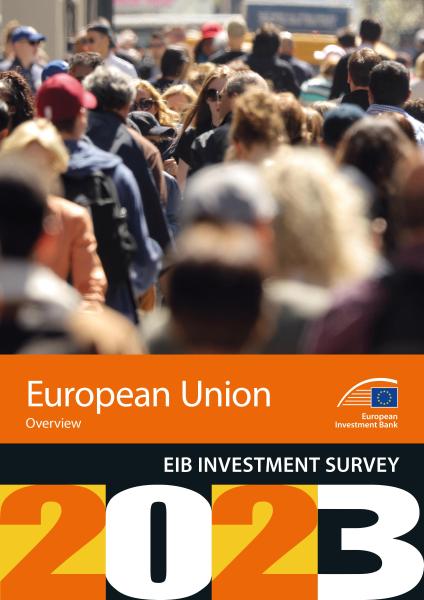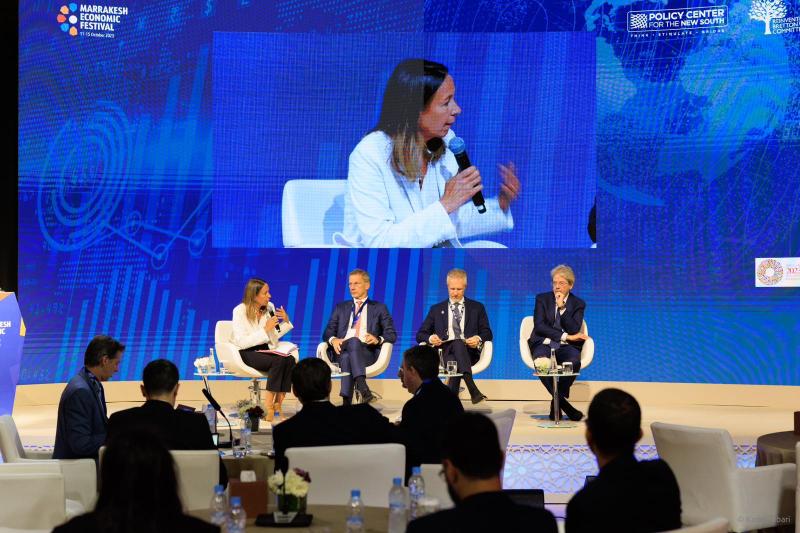
- 64% of EU firms are facing physical risks due to climate change (7 percentage points more than the previous year).
- Only 13% have bought insurance to offset climate-related losses.
- EU firms’ overall investment is back to pre-pandemic levels and 70% of EU firms now use advanced digital technologies.
- 51% of EU firms are investing in energy efficiency amid price shocks.
- 81% of European businesses signal difficulties in finding skilled staff.
According to the new European Investment Bank (EIB) Investment Survey (EIBIS) 2023 released today at the World Bank IMF Annual Meetings, European firms are facing challenges amid pressing investment needs and increasingly stringent financial conditions across the region.
Companies have accelerated investments in energy efficiency, with 51% of EU firms investing in this area in the past year, thus responding to the energy price shock. Firms confirmed the crucial role played by internal finance buffers and policy support in sustaining investment levels. At the same time, 64% of firms have experienced losses due to climate change (7 percentage points more than the previous year). Only about half of those firms, however, are taking action to build climate resilience and only 13% are insured for physical risk protection.
However, 29% of European businesses still perceive the climate transition as an opportunity. On average, European businesses are also increasing their investment in tackling climate change, investing more than their counterparts in the United States.
Despite the prevailing uncertainties, the 13 000 businesses interviewed by the Bank in mid-2023 reveal that corporate investment has remained resilient across the European Union so far. The share of EU firms that have invested in the past year has returned to pre-pandemic levels, with investment per employee witnessing a further increase. This positive result was driven by firms' recognition of the urgent need for structural transformation and buffers accumulated in recent years.
About 80% of EU firms recorded profits in their last financial year, restoring the share of profitable firms to pre-COVID levels. Furthermore, policy support and government grants have contributed to investment, with capital transfers from public to private sector averaging close to 2% of gross domestic product (GDP) for the third consecutive year. However, as financial aid is cut back, the implications of tighter financial conditions become more pronounced.
One of the key findings of the survey is the significant progress made by European firms in digitalisation, narrowing the gap with the United States. Approximately 70% of EU firms now use advanced digital technologies, marking a post-pandemic trend of recovery.
Going forward, the EIBIS 2023 highlights firms' negative perceptions of the political and economic climate, with more EU firms expecting a deterioration in the coming year. Firms are also signalling a negative outlook with respect to access to external finance, amid tightening financing conditions and a progressive reduction in widespread policy support. Meanwhile, 81% of businesses see difficulties in finding skilled staff as an obstacle. There is evidence that firms perform better when they invest in knowledge and skills.
EIB Vice-President Ricardo Mourinho Felix said: “The EIBIS 2023 underscores the resilience of European firms in the face of evolving challenges. It is encouraging to see their continued commitment to investment amidst tightening financial conditions. What is also striking about this report is that majority of businesses report that they have been affected by climate change. It is essential for policymakers and stakeholders to recognise the pressing need for targeted support measures to sustain and stimulate investment as well as to help them build climate resilience.”
EIB Chief Economist Debora Revoltella added: “The main challenge ahead is related to the competitiveness of EU firms, and this requires continued investment. Maximising returns on digital investments, reducing energy consumption and enhancing efficiency, and addressing skill shortages are critical to ensuring sustainable growth and securing Europe's position in the global market.” More on Europe’s economy in the new What’s the Matter? episode here.
The EIBIS 2023 report serves as a comprehensive resource for policymakers, economists, and business leaders, providing valuable insights into the investment landscape and identifying key areas that require attention to foster economic growth and resilience. For more information and to access the full report, please visit our website here.

Background information
The European Investment Bank (EIB) is the long-term lending institution of the European Union and is owned by its Member States. It provides finance and expertise for projects that contribute to the EU's objectives. The EIB works closely with public and private-sector partners to support sustainable investment, job creation, economic growth, and innovation across Europe.
About the report
The EIB Group Survey on Investment, which has been administered since 2016, is a unique, annual survey of some 13 000 firms. Data were collected in mid-2023 from firms in all EU Member States. The survey also includes a sample of firms in the United States. The survey collects data on firm characteristics and performance, past investment activities and future plans, sources of finance, financing issues and other challenges that firms face, such as climate change, digitalisation and international trade.